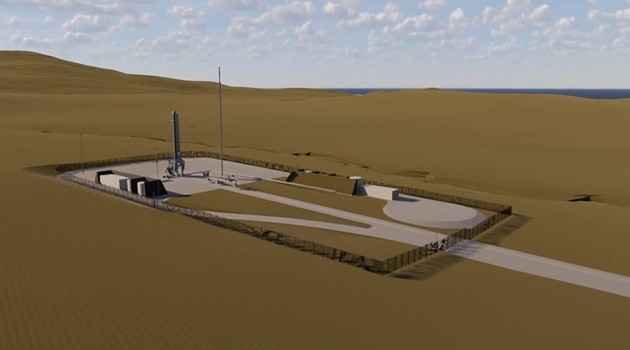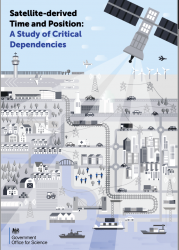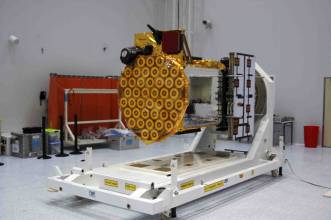Plans have been submitted for a rocket launch site in the north of Scotland that could boost communications satellites into orbit in two years. No word has come regarding the possibility of launching satellites of the United Kingdom’s a-borning GNSS from this facility, but the prospect is intriguing.
The Highlands and Islands Enterprise (HIE), the Scottish Government’s economic and community development agency for the north and west of Scotland, has submitted a planning application for a vertical launch site, Space Hub Sutherland, that it plans to construct on the A’ Mhoine peninsula, Melness, near Tongue.
[Above: Artist impression of the proposed Space Hub Sutherland. Credit NORR Architects]
If the application is approved, construction on Europe’s first vertical launch site could begin later this year, with launches starting as early as 2022. The planners say that up to 12 launches a year could be made from Sutherland, carrying small commercial satellites that will typically be used for Earth observation.
Galileo satellites, which the UK will soon try to emulate with its own versions, are significantly heavier than small communications satellites. However, technological advances and changes in requirements could well affect satellite design and weight. UK aerospace company Surrey Satellite Technology Limited, which supplied 22 Galileo navigation payloads between 2014 and 2016, is known as a highly innovative center. It already has extensive experience manufacturing both communication and navigation satellite payloads.
A Very British GNSS
At the heart of the matter lies Galileo’s Public Regulated Service (PRS), an encrypted navigation service to be employed by government agencies, military and emergency services. The European Union continues to maintain that only EU members will have PRS access once it launches — in 2020? The UK government has acknowledged that it will not be allowed to use this feature, prompting its ministers to sign off on £92 million in funding last year to map out plans for a post-Brexit UK satellite system.
Minister of State for Universities, Science, Research and Innovation Chris Skidmore confirmed in December that the project will go ahead. He told the Express newspaper: “We had 50 companies that have been involved in the process so far. The UK Space Agency won’t let me go into detail about the specific companies, but next year, around March time, there will be a £5 billion program announced.
“This will be through a number of stages. We would want it fully delivered by 2030 but the first satellites would go up by 2025. That’s where we are with out GNSS program, we’ve put in the orders for the atomic clocks which need to be purchased and there’s a waiting time for those.”






